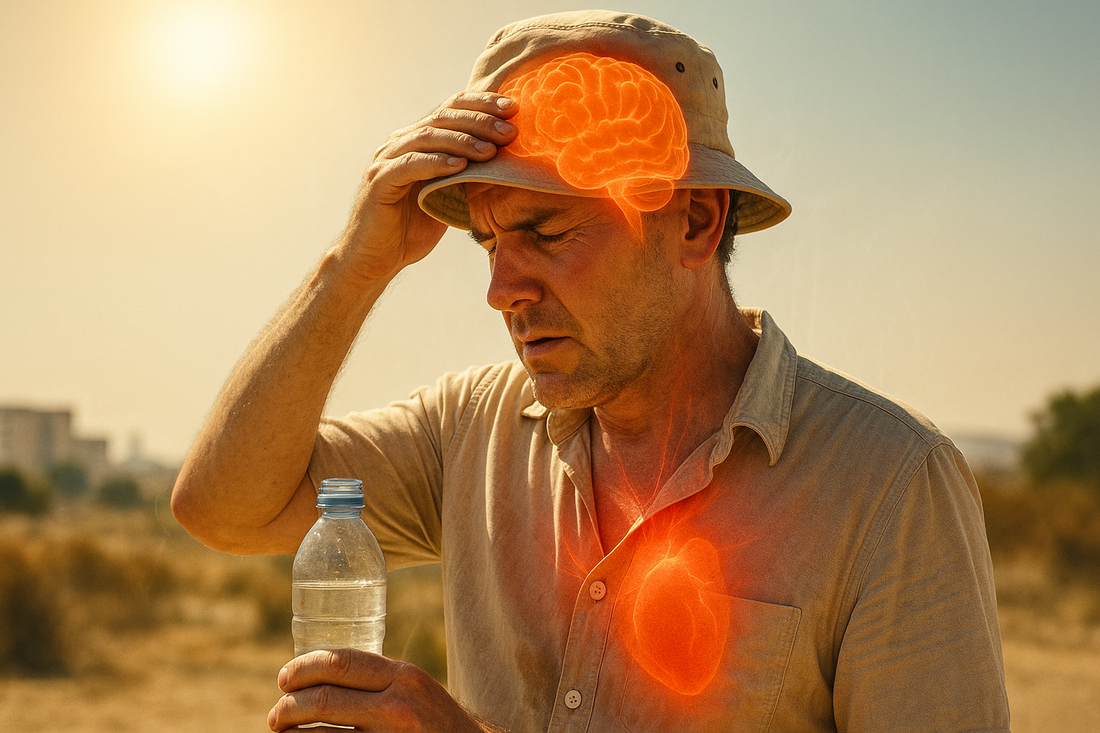
How Excessive Heat Affects Your Body and Mind
Share
Excessive heat, also known as heat stress or hyperthermia, is a common environmental challenge in many parts of the world. Prolonged exposure to high temperatures can have serious effects on both the body and mind, ranging from mild discomfort to life-threatening conditions. Understanding how heat affects the human system is crucial for prevention, timely management, and maintaining overall health.
With global temperatures rising and heatwaves becoming more frequent, awareness about heat-related health risks is more important than ever.
Effects of Excessive Heat on the Body

1. Dehydration and Electrolyte Imbalance
When the body is exposed to high temperatures, sweating increases to cool the body down. This can lead to:
- Fluid loss, causing dehydration
- Electrolyte imbalance, particularly sodium, potassium, and magnesium
- Symptoms: dizziness, fatigue, headache, dry mouth, and rapid heartbeat
Dehydration can affect kidney function, blood pressure, and circulation, and may lead to more severe conditions if not managed promptly.
2. Heat Exhaustion and Heat Stroke
Excessive heat can trigger heat-related illnesses, including:
- Heat Exhaustion: Characterized by heavy sweating, weakness, nausea, and fainting. It occurs when the body cannot cool itself efficiently.
- Heat Stroke: A life-threatening condition where body temperature rises above 40°C (104°F), leading to confusion, rapid pulse, and sometimes loss of consciousness. Immediate medical intervention is essential.
3. Cardiovascular Stress
High temperatures force the heart to work harder to pump blood to the skin for cooling. This increases heart rate and strain, especially in people with pre-existing heart disease or hypertension.
4. Respiratory Effects
Hot weather can worsen respiratory conditions like asthma, chronic bronchitis, and COPD. Heat and humidity can reduce oxygen efficiency, making breathing more difficult.
5. Skin Issues
Excessive heat can lead to:
- Rashes or prickly heat
- Sunburn from UV exposure
- Premature skin aging due to damage from prolonged sunlight
Effects of Excessive Heat on the Mind
 1. Cognitive Impairment
1. Cognitive Impairment
High temperatures can reduce mental performance, including:
- Difficulty concentrating
- Reduced memory retention
- Slower decision-making
Studies show that even moderate heat can affect reaction times and attention span, impacting productivity and safety.
2. Mood Changes
Heat exposure can increase irritability, anxiety, and restlessness. Chronic heat stress may even contribute to sleep disturbances, which further affect mood and cognitive function.
3. Heat-Related Fatigue
Feeling mentally drained or lethargic in hot weather is common. Fatigue affects learning, creativity, and problem-solving ability, making it harder to perform daily tasks efficiently.
Ayurvedic Perspective on Excessive Heat
 Ayurveda recognizes excessive heat as a disturbance of the Pitta dosha, which governs metabolism, digestion, and body heat. When Pitta is aggravated due to hot weather, the body may experience:
Ayurveda recognizes excessive heat as a disturbance of the Pitta dosha, which governs metabolism, digestion, and body heat. When Pitta is aggravated due to hot weather, the body may experience:
- Physical symptoms: burning sensation, skin rashes, excessive sweating, acidity
- Mental symptoms: irritability, impatience, anger, and restlessness
Ayurvedic Measures to Balance Heat
- Cooling herbs and foods: Aloe vera, coriander, mint, cucumber, and coconut water
- Hydration: Emphasis on warm or room-temperature water in small sips to maintain balance
- Lifestyle adjustments: Avoid excessive sun exposure, practice Shitali or Sheetkari pranayama (cooling breathing exercises), and maintain a calm, stress-free routine
- Topical oils: Application of coconut or sandalwood oil can soothe overheated skin
These measures, combined with modern hydration and heat-avoidance strategies, help reduce the impact of excessive heat on both body and mind.
Prevention and Safety Tips
 1. Stay Hydrated
1. Stay Hydrated
Drink plenty of water and electrolyte-rich fluids. Avoid excessive caffeine or alcohol, which can worsen dehydration.
2. Avoid Peak Heat Hours
Limit outdoor activities between 10 AM and 4 PM, when temperatures and UV exposure are highest.
3. Wear Protective Clothing
- Light, loose, and breathable fabrics
- Hats and sunglasses for sun protection
- Apply sunscreen to prevent sunburn
4. Optimize Indoor Environment
Use fans or air conditioning, close blinds during peak heat, and maintain ventilation to prevent indoor heat buildup.
5. Diet Considerations
- Favor light, cooling meals with fruits, vegetables, and salads
- Avoid heavy, fried, and spicy foods that increase internal heat
- Include fluids like coconut water, buttermilk, and herbal teas
6. Recognize Warning Signs
Seek immediate medical attention for symptoms of heat exhaustion or heat stroke, including confusion, dizziness, fainting, high body temperature, and rapid pulse.
Long-Term Implications of Repeated Heat Exposure
Chronic exposure to high temperatures without adequate protection can lead to:
- Kidney stones or chronic kidney disease due to ongoing dehydration
- Cardiovascular strain, increasing the risk of heart attacks in vulnerable populations
- Mental health effects, including anxiety and chronic fatigue
- Exacerbation of existing medical conditions, such as diabetes, respiratory diseases, and hypertension
Awareness and proactive measures are key to preventing long-term damage.
For regular health tips & updates visit Ayushakti’s Social Media Pages:
- Facebook – Ayushakti Ayurved | Facebook
- Instagram – Ayushakti Ayurved (@ayushakti)
- Pinterest – ayushaktiayurveda
Get all the updates about Ayushakti Ayurved on WhatsApp directly. Click here to Join our WhatsApp Channel
Ayushakti's mission is to help people in every way possible. Our Ayurvedic experts are available to give you a consultation either over the phone or through a video consultation. We recommend customised diets, home remedies, and detox therapies to help you recover from health problems. Book your consultation now!
If you would like to know the location or visit one of our centres, please click here: https://www.ayushakti.com/home/p/contact
For more information, write to us at info@ayushakti.com or call our toll-free numbers: 18002663001 (India) and +18002800906 (Global).
Blog Author: Dr. Ramchandra Konduskar
Expert Review: Dr Smita Pankaj Naram
Co-Founder, Ayushakti Ayurved Pvt Ltd
Disclaimer: This blog is for educational purposes only. Please consult an Ayurvedic practitioner before trying or consuming any medicines, home remedies or treatments mentioned in this blog. The information provided is not intended to diagnose, treat, cure, or prevent any disease.





